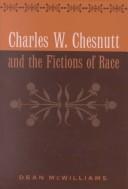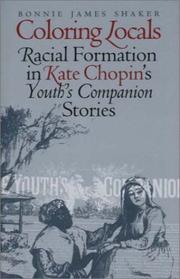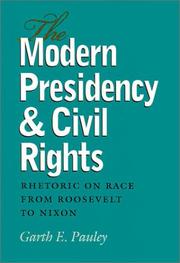| Listing 1 - 6 of 6 |
Sort by
|

ISBN: 1282726013 9786612726019 0820327247 9780820327242 9780820324357 0820324353 9781282726017 6612726016 Year: 2002 Publisher: Athens University of Georgia Press
Abstract | Keywords | Export | Availability | Bookmark
 Loading...
Loading...Choose an application
- Reference Manager
- EndNote
- RefWorks (Direct export to RefWorks)
Looking anew at Chesnutt's public and private writings and his well-known and recently rediscovered works, McWilliams explores Chesnutt's distinctive contribution to American culture: how his stories and novels challenge our dominant cultural narratives--particularly their underlying assumptions about race.
Race in literature. --- Group identity in literature. --- African Americans in literature. --- Identity (Psychology) in literature. --- African Americans --- Afro-Americans in literature --- Negroes in literature --- Negritude --- Race identity. --- Ethnic identity --- Chesnutt, Charles W. --- Criticism and interpretation. --- Views on race.

ISBN: 1587294281 9781587294280 9780877458289 0877458286 Year: 2003 Publisher: Iowa City
Abstract | Keywords | Export | Availability | Bookmark
 Loading...
Loading...Choose an application
- Reference Manager
- EndNote
- RefWorks (Direct export to RefWorks)
Shaker's volume is an important contribution to both Chopin criticism and to the growing field of race research known as whiteness studies. --Choice
Women and literature --- Local color in literature. --- Racism in literature. --- Race in literature. --- Literature --- History --- Chopin, Kate, --- Chopin, Kate O'Flaherty, --- Chopin, Katherine O'Flaherty, --- O'Flaherty, Catherine, --- Criticism and interpretation. --- Views on race. --- Louisiana --- Louisiana (Province) --- Louisiana (Territory) --- Louisiane --- État de Louisiane --- Léta de la Lwizyàn --- Lwizyàn --- State of Louisiana --- US-LA --- La. --- Louisianne --- Territory of Louisiana --- District of Louisiana --- West Florida --- Territory of Orleans --- In literature. --- Luisiana
Book
ISBN: 1461943124 1438443633 9781461943129 9781438443638 9781438443614 1438443617 Year: 2013 Publisher: Albany
Abstract | Keywords | Export | Availability | Bookmark
 Loading...
Loading...Choose an application
- Reference Manager
- EndNote
- RefWorks (Direct export to RefWorks)
Kant and the Concept of Race features translations of four texts by Immanuel Kant frequently designated his Racenschriften (race essays), in which he develops and defends an early theory of race. Also included are translations of essays by four of Kant's contemporaries—E. A. W. Zimmermann, Georg Forster, Christoph Meiners, and Christoph Girtanner—which illustrate that Kant's interest in the subject of race was part of a larger discussion about human "differences," one that impacted the development of scientific fields ranging from natural history to physical anthropology to biology.
Race --- Physical anthropology --- Study and teaching. --- Philosophy. --- Kant, Immanuel, --- Kant, Immanuel --- Kant, I. --- Kānt, ʻAmmānūʼīl, --- Kant, Immanouel, --- Kant, Immanuil, --- Kʻantʻŭ, --- Kant, --- Kant, Emmanuel, --- Ḳanṭ, ʻImanuʼel, --- Kant, E., --- Kant, Emanuel, --- Cantơ, I., --- Kant, Emanuele, --- Kant, Im. --- קאנט --- קאנט, א. --- קאנט, עמנואל --- קאנט, עמנואל, --- קאנט, ע. --- קנט --- קנט, עמנואל --- קנט, עמנואל, --- كانت ، ايمانوئل --- كنت، إمانويل، --- カントイマニユエル, --- Kangde, --- 康德, --- Kanṭ, Īmānwīl, --- كانط، إيمانويل --- Kant, Manuel, --- Views on race. --- Philosophy --- Study and teaching

ISBN: 1585449016 1585441074 9781585441075 9781585449019 Year: 2001 Volume: no. 3 Publisher: College Station : Texas A&M University Press,
Abstract | Keywords | Export | Availability | Bookmark
 Loading...
Loading...Choose an application
- Reference Manager
- EndNote
- RefWorks (Direct export to RefWorks)
"Every President since Franklin Roosevelt has confronted civil rights issues during his tenure in the White House, and most have faced intense demands to speak publicly about the nation's racial problems and possible solutions. Indeed, modern American presidents have become a major focal point for the civil rights struggle." "In The Modern Presidency and Civil Rights, Garth E. Pauley examines modern presidents' communicative and symbolic involvement in these matters, focusing on four crucial speeches, the circumstances surrounding them, and their effect on public attitudes and policy."--Jacket.
Presidents --- Rhetoric --- Political oratory --- Communication in politics --- African Americans --- Political culture --- English language --- African-Americans --- Regions & Countries - Americas --- History & Archaeology --- United States - General --- Afro-Americans --- Black Americans --- Colored people (United States) --- Negroes --- Africans --- Ethnology --- Blacks --- Political communication --- Political science --- Parliamentary oratory --- Political speaking --- Oratory --- Politics, Practical --- Public speaking --- Language and languages --- Speaking --- Authorship --- Expression --- Literary style --- Presidency --- Heads of state --- Executive power --- Racial attitudes of American presidents --- Racial attitudes. --- Language. --- Political aspects --- History --- Civil rights --- Rhetoric. --- Racial attitudes --- Language --- Views on race question --- United States --- Race relations --- Political aspects. --- Politics and government --- Black people --- Germanic languages --- History.

ISBN: 1107123933 0521033306 0511119704 0511485026 0511153775 0511303556 0511044070 128015490X 0511017855 9780511017858 9780511044076 9780511119705 9780521806015 0521806011 9780511485022 9781107123939 9780521033305 9780511153778 9780511303555 Year: 2001 Publisher: Cambridge, UK ; New York, NY : Cambridge University Press,
Abstract | Keywords | Export | Availability | Bookmark
 Loading...
Loading...Choose an application
- Reference Manager
- EndNote
- RefWorks (Direct export to RefWorks)
In Modernism and Eugenics, first published in 2001, Donald Childs shows how Virginia Woolf, T. S. Eliot and W. B. Yeats believed in eugenics, the science of race improvement and adapted this scientific discourse to the language and purposes of the modern imagination. Childs traces the impact of the eugenics movement on such modernist works as Mrs Dalloway, A Room of One's Own, The Waste Land and Yeats's late poetry and early plays. The language of eugenics moves, he claims, between public discourse and personal perspectives. It informs Woolf's theorization of woman's imagination; in Eliot's poetry, it pictures as a nightmare the myriad contemporary eugenical threats to humankind's biological and cultural future. And for Yeats, it becomes integral to his engagement with the occult and his commitment to Irish Nationalism. This is an interesting study of a controversial theme which reveals the centrality of eugenics in the life and work of several major modernist writers.
English literature --- Modernism (Literature) --- Degeneration in literature. --- Eugenics in literature. --- Race in literature. --- History and criticism. --- Woolf, Virginia, --- Eliot, T. S. --- Yeats, W. B. --- Yeats, William Butler --- D. E. D. I., --- Daemon Est Deus Inversus, --- Ganconagh, --- I., D. E. D., --- Йейтс, У. Б. --- Ĭeĭts, U. B. --- Йейтс, Уильям Батлер, --- Ĭeĭts, Uilʹi︠a︡m Batler, --- Weilian Batele Yezhi, --- Yeṭs, Ṿilyam Baṭler, --- יטס, יטלאם בטלר --- ייטס, ויליאם בטלר, --- 威廉,巴特勒,叶芝, --- Eliot, Thomas Stearns --- Woolf, Virginia Stephen, --- Stephen, Virginia, --- Ulf, Virzhinii︠a︡, --- Ṿolf, Ṿirg'inyah, --- Vulf, Virdzhinii︠a︡, --- Вулф, Вирджиния, --- וולף, וירג׳יניה --- וולף, וירג׳יניה, --- Stephen, Adeline Virginia, --- Views on race. --- Degeneration in literature --- Eugenics in literature --- Race in literature --- 820 "19" --- 820 "19" Engelse literatuur--20e eeuw. Periode 1900-1999 --- Engelse literatuur--20e eeuw. Periode 1900-1999 --- History and criticism --- Criticism and interpretation. --- Woolf, Virginia --- Arts and Humanities --- Literature --- Ai-lüeh-tʻe, --- Īliyūt, T. S., --- Elliŏtʻŭ, --- Eliot, Thōmas S., --- Eliot, Th. S., --- Eliot, Thomas Stern, --- Elyoṭ, T. S., --- Ėliot, Tomas Stirns, --- אליוט ט.ס --- אליוט, ת. ס.
Book
ISBN: 143847153X 9781438471532 9781438471518 1438471513 1438471521 Year: 2019 Publisher: Albany, New York : State University of New York Press,
Abstract | Keywords | Export | Availability | Bookmark
 Loading...
Loading...Choose an application
- Reference Manager
- EndNote
- RefWorks (Direct export to RefWorks)
Despite major advancements in civil rights in the United States since the 1960s, racial inequality continues to persist in American society. While it may appear that presidents do not address the topic of race, it lurks in the background of presidential political speech across a range of issues, including welfare, crime, and American identity. Using a thorough approach that places textual analysis in a historical context, One America? asks what presidents say about race, how often they say it, and to whom they say it. Nathan Angelo demonstrates how presidents attempt to use rhetoric to compose a message that will resonate with the many groups that comprise the modern party system, but ultimately those alliances cause presidents to direct most of their speeches about race to an archetypical white, Middle-American swing voter, thereby restricting the issues and solutions that they discuss. While the American demographic profile is changing, rhetoric that links American identity with racially coded concepts and appeals to white voters' racial resentments has become ubiquitous. Angelo warns us about the possible repercussions of such tactics, noting that, while they may allow presidents to craft winning coalitions, their use continues to legitimate a system that ignores racial inequality.
Presidents --- Communication in politics --- Rhetoric --- Political oratory --- Language and languages --- Speaking --- Authorship --- Expression --- Literary style --- Political communication --- Political science --- Presidency --- Heads of state --- Executive power --- Racial attitudes of American presidents --- Racial attitudes. --- Election --- History --- Social aspects --- Political aspects --- Views on race question --- United States --- ABŞ --- ABSh --- Ameerika Ühendriigid --- America (Republic) --- Amerika Birlăshmish Shtatlary --- Amerika Birlăşmi Ştatları --- Amerika Birlăşmiş Ştatları --- Amerika ka Kelenyalen Jamanaw --- Amerika Qūrama Shtattary --- Amerika Qŭshma Shtatlari --- Amerika Qushma Shtattary --- Amerika (Republic) --- Amerikai Egyesült Államok --- Amerikanʹ Veĭtʹsėndi︠a︡vks Shtattnė --- Amerikări Pĕrleshu̇llĕ Shtatsem --- Amerikas Forenede Stater --- Amerikayi Miatsʻyal Nahangner --- Ameriketako Estatu Batuak --- Amirika Carékat --- AQSh --- Ar. ha-B. --- Arhab --- Artsot ha-Berit --- Artzois Ha'bris --- Bí-kok --- Ē.P.A. --- EE.UU. --- Egyesült Államok --- ĒPA --- Estados Unidos --- Estados Unidos da América do Norte --- Estados Unidos de América --- Estaos Xuníos --- Estaos Xuníos d'América --- Estatos Unitos --- Estatos Unitos d'America --- Estats Units d'Amèrica --- Ètats-Unis d'Amèrica --- États-Unis d'Amérique --- Fareyniḳṭe Shṭaṭn --- Feriene Steaten --- Feriene Steaten fan Amearika --- Forente stater --- FS --- Hēnomenai Politeiai Amerikēs --- Hēnōmenes Politeies tēs Amerikēs --- Hiwsisayin Amerikayi Miatsʻeal Tērutʻiwnkʻ --- Istadus Unidus --- Jungtinės Amerikos valstybės --- Mei guo --- Mei-kuo --- Meiguo --- Mî-koet --- Miatsʻyal Nahangner --- Miguk --- Na Stàitean Aonaichte --- NSA --- S.U.A. --- SAD --- Saharat ʻAmērikā --- SASht --- Severo-Amerikanskie Shtaty --- Severo-Amerikanskie Soedinennye Shtaty --- Si︠e︡vero-Amerikanskīe Soedinennye Shtaty --- Sjedinjene Američke Države --- Soedinennye Shtaty Ameriki --- Soedinennye Shtaty Severnoĭ Ameriki --- Soedinennye Shtaty Si︠e︡vernoĭ Ameriki --- Spojené staty americké --- SShA --- Stadoù-Unanet Amerika --- Stáit Aontaithe Mheiriceá --- Stany Zjednoczone --- Stati Uniti --- Stati Uniti d'America --- Stâts Unîts --- Stâts Unîts di Americhe --- Steatyn Unnaneysit --- Steatyn Unnaneysit America --- SUA (Stati Uniti d'America) --- Sŭedineni amerikanski shtati --- Sŭedinenite shtati --- Tetã peteĩ reko Amérikagua --- U.S. --- U.S.A. --- United States of America --- Unol Daleithiau --- Unol Daleithiau America --- Unuiĝintaj Ŝtatoj de Ameriko --- US --- USA --- Usono --- Vaeinigte Staatn --- Vaeinigte Staatn vo Amerika --- Vereinigte Staaten --- Vereinigte Staaten von Amerika --- Verenigde State van Amerika --- Verenigde Staten --- VS --- VSA --- Wááshindoon Bikéyah Ałhidadiidzooígíí --- Wilāyāt al-Muttaḥidah --- Wilāyāt al-Muttaḥidah al-Amirīkīyah --- Wilāyāt al-Muttaḥidah al-Amrīkīyah --- Yhdysvallat --- Yunaeted Stet --- Yunaeted Stet blong Amerika --- ZDA --- Združene države Amerike --- Zʹi︠e︡dnani Derz︠h︡avy Ameryky --- Zjadnośone staty Ameriki --- Zluchanyi︠a︡ Shtaty Ameryki --- Zlucheni Derz︠h︡avy --- ZSA --- Η.Π.Α. --- Ηνωμένες Πολιτείες της Αμερικής --- Америка (Republic) --- Американь Вейтьсэндявкс Штаттнэ --- Америкӑри Пӗрлешӳллӗ Штатсем --- САЩ --- Съединените щати --- Злучаныя Штаты Амерыкі --- ولايات المتحدة --- ولايات المتّحدة الأمريكيّة --- ولايات المتحدة الامريكية --- 미국 --- Race relations --- Politics and government --- Spojené obce severoamerické --- États-Unis --- É.-U. --- ÉU
| Listing 1 - 6 of 6 |
Sort by
|

 Search
Search Feedback
Feedback About UniCat
About UniCat  Help
Help News
News